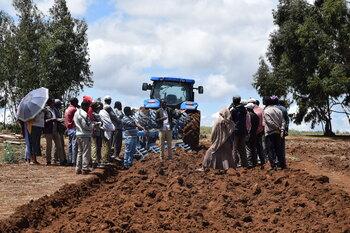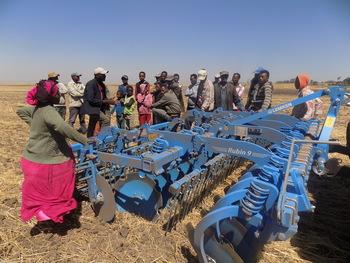Context
Agriculture plays a major role in Ethiopian society. It provides a livelihood for around 80 per cent of the population and accounts for 40 per cent of total economic output. In some areas of the country, considerable increases in production are possible, which could in turn be used to supply other parts of the country or even allow Ethiopia to become a net food exporter.
The Ethiopian Government wants to adopt agricultural mechanisation solutions as a way of achieving sustainable increases in smallholder productivity, therefore contributing to both higher incomes and the development of rural regions.
There are around 400 mechanisation service providers supporting Ethiopian smallholders in working their land. Yet the demand for such services far outstrips the supply. The use of machinery has been restricted largely to primary soil cultivation and to harvesting grain with combines. In many cases, the technology used is not only unsuitable for the agricultural conditions, but is also outdated and of poor quality. Furthermore, the number of technical training courses available in the area of agricultural technology is limited. The efficiency and quality of mechanisation services are therefore also low.
The lack of innovation in agricultural mechanisation and technology prevents smallholders from increasing their productivity and income.
Objective
More smallholders are using high-quality mechanisation services and technologies. This raises their productivity and income levels.
Approach
The project supports the Ethiopian Government in improving the access of mechanisation services for smallholders. The agricultural authorities at federal and state level are developing strategies to promote the use of mechanisation. Dialogue between the private sector, associations, cooperatives and the public sector is also being promoted. This makes it easier for the stakeholders to exchange experience and promotes mutual understanding of their different perspectives and the challenges they face.
Working with international partners and Ethiopian training institutions, the project is developing the capacities of mechanisation service providers. Technical and business management training courses improve the quality and efficiency of services.
A buyers’ guide is being developed to provide technical knowledge about important technologies and help service providers make informed investment decisions.
Practical demonstrations of modern mechanisation technologies are conducted on smallholders’ fields to illustrate the positive impacts of the technology on yields. The demonstrations involve a wide range of farming equipment that can be used for various types of field operations – beyond ploughing and harvesting. The aim is to boost demand for these services and, in turn, make investments in such technologies profitable for service providers.

